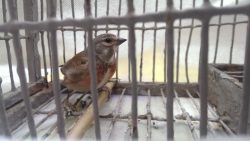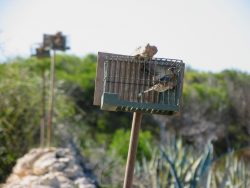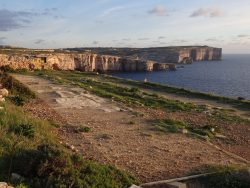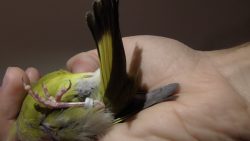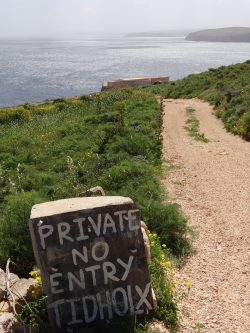If there was any doubt that there is no justification for finch trapping in Malta and that the derogation from the European Birds’ Directive runs counter to EU law, this has now been made clear by none other than the Attorney General (AG) himself who is supposed to be leading the defense on behalf of the Maltese Government in the legal case initiated by the European Commission against Malta in 2015, which will be heard tomorrow at the European Court of Justice in Luxembourg.
As was revealed by a local newspaper last Sunday, instead of defending the Maltese Government’s arguments, the Office of the Attorney General is not in agreement with the position adopted by the Government and is warning the Government that it cannot win the bird trapping case as it stands no chance of successfully defending the derogation in court.
At a press conference in front of the Law Courts in Valletta, BirdLife Malta President Darryl Grima explained that according to what was revealed by MaltaToday at the end of the week, when in 2014 the Government of Malta decided to press ahead and open a trapping season of seven species of wild finches, this was done against the AG’s legal advice and despite the warning by the AG not to open the season and not to apply the derogation.
This led the European Commission to send a letter of formal notice in October 2014, urging Malta to refrain from finch trapping. Despite this warning, Malta went ahead as planned with the opening of a finch trapping season in 2014 and the Commission then sent a reasoned opinion in May 2015 urging Malta to end the practice. Malta replied, contesting the Commission’s analysis and the European Commission therefore referred Malta to the European Court of Justice with the legal action initiated in September of the same year.
In a nutshell, the Attorney General:
- Did not agree with the Maltese Government’s arguments and clearly warned him that the case could not be won,
- Warned the Government that its legal arguments to justify the application of a derogation were “inherently weak”,
- Warned that Malta stood no chance of successfully defending its case in court and should not apply the derogation,
- Stated that the derogation ran counter to the very spirit and purpose of the Birds’ Directive,
- Warned the Government that should it decide to press ahead with applying the derogation – as it in fact did – it would be doing so against its express and consistent legal advice,
- Made it clear to the Government that no amount of rhetoric would stop the ECJ from throwing out Malta’s case.
Eventually, according to the newspaper report, the Government chose to press ahead without heeding the AG’s advice and sought an independent legal opinion. We understand that for the hearing at the European Court the Hon. Parliamentary Secretary Roderick Galdes has opted to engage a foreign legal entity to defend the Maltese Government’s position.
BirdLife Malta CEO Mark Sultana, who also addressed the press conference, stated that the Attorney General’s advice to the Government simply proves BirdLife Malta right and solidifies what the NGO has been stating from way back in 2014. Mainly that the derogation applied by the Maltese Government cannot be justified on many levels.
Primarily this derogation goes against the spirit of the EU Birds’ Directive and in Malta’s case even more because the seven finch species allowed to be trapped are all protected species. How can protected birds ever be justifiably caught and taken from the wild? Another fact is that the traditional trapping method by clap-nets used in Malta is non-selective and is specifically mentioned and prohibited by the Birds’ Directive. Finally, our Government is trying to justify the trapping season simply because it is a socio-cultural activity which is carried out for leisure and which has been going on for many years. But trapping birds for leisure does not constitute a justification to derogate (“judicious” reason) and there are suitable alternatives.
To make things worse, the strict supervision which is a condition of this derogation is nothing but a farce. This is mainly because the same conditions set out by the Government cannot be enforced due to the extent of this practice.
We have also realised that police are reactive and hardly ever take the initiative to do their own investigations. A case in point is the market, or business venture, of finches. BirdLife Malta has been investigating the markets and pet shops during the season making several reports to the police. The police recently confirmed that they have only visited such sites when we reported incidents and had never done any spot checks themselves. BirdLife Malta has also managed to take aerial shots of trapping sites and identified many illegal sites – a large number of illegalities for a small country such as ours even when we have promised the European Union strict supervision.
BirdLife Malta’s Conservation Manager Nicholas Barbara stated that BirdLife Malta has been following the application of this derogation since its inception in 2014. The organisation had made its position well-known regarding the enforcement difficulties such a derogation would bring, with over 4,600 trappers authorised to trap wild birds.
Since its start, derogation conditions were not followed. Instead of limiting the derogation to those who practiced finch trapping in the past for so called traditional reasons, new applications for trapping licences were authorised to persons who never practiced before. This resulted in thousands of trapping sites being registered and used, which the Wild Birds Regulation Unit (WBRU), along with the Environment Resources Authority (ERA) and the Malta Police Force could not even control. BirdLife Malta has several times requested the Government authorities to render public, environmental data concerning the locations of these authorised trapping sites yet this information remains blocked. This to the extent that following two years BirdLife Malta has been demanding justice, a court case is now awaited.
For the last trapping season, BirdLife Malta made use of aerial surveys to check the situation on the ground. Out of a sample of trapping sites reported to WBRU, 46% turned out to be non-registered and illegal – the majority of such sites situated on prime habitats within Natura 2000 sites which ERA is obliged to protect and manage.
The conditions permitted by these derogations have rendered enforcement impossible. Over 4,600 trappers were able to register two trapping sites each, for a trapping season of two and a half months and a bag limit of finches. Yet in three trapping seasons, national quotas have never been reached, except for two occasions for Hawfinch which has a national quota of 500 birds. To make matters worse, declarations traditionally are made during the last few days of a trapping season.
Apart from the quotas issue, which allowed trappers to trap far beyond their quotas with ease, the spot check system proved ineffective. BirdLife Malta highlighted the problems associated with the so called single-use ring system since 2014. One wonders what has happened to birds caught in past trapping seasons in which birds of wild origin simply do not survive in captivity, meaning that a trapper has to somehow replenish his stock next time round. This is where one of the most negative elements of this derogation comes into play – the illegal trade of wild birds brought about by this derogation.
For the first time, BirdLife Malta is today revealing video footage from investigations it has held at markets and pet shops over the last two months. It reveals effectively the commercial aspect of this derogation that persists illegally and blatantly in the face of enforcement authorities – the same authorities who should be guaranteeing strict supervision conditions for this derogation.
In a nutshell, the finch trapping derogation has shown to not simply be unjustified, but also unenforceable. From the manner in which licences were vetted out, to a practically free for all situation in trapping wild finches, finch trapping derogations have proven to be rife with abuse.
In conclusion, now that it is clear that the Government has acted against the legal advice of the Attorney General, we also expect the Opposition to declare its position on this matter.
While it is true that the case initiated by the European Commission is against Malta, we agree in full with the statement issued yesterday by BirdLife Europe which explained that the Maltese people have an increasing environmental conscience on trapping and hunting issues. The legal action by the Commission is against the decision taken by the Maltese Government to open finch trapping seasons. Had the Government shied away from political promises and based its decisions on conservation values and legal advice, Malta would not be in this situation today.
Read the Maltese version of the press release here. Watch the video on illegal trade of finches in Malta here.
Other related links

